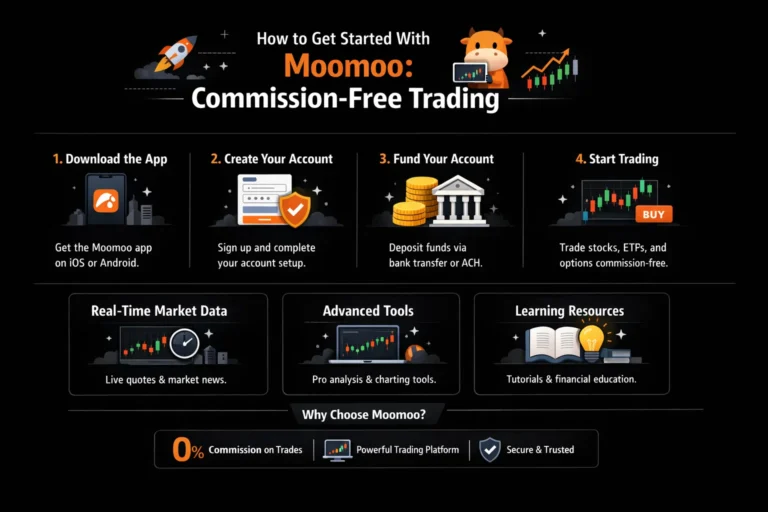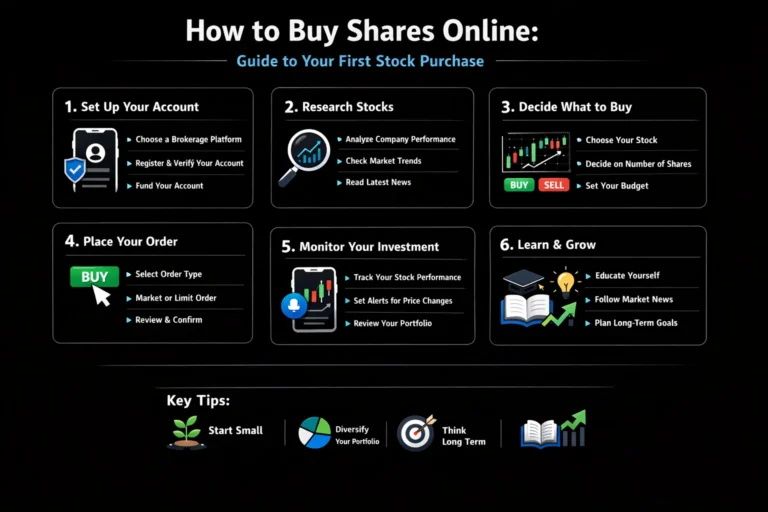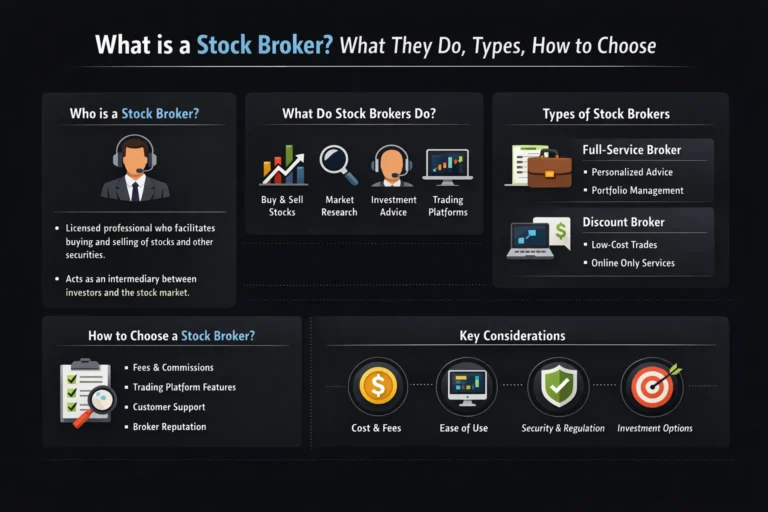
Types of Stock Markets, How Stock Markets Really Work
From the bustling trading floors of primary exchanges to the digital realm of private marketplaces, the term “stock market” isn’t a monolith. Navigating between primary and secondary markets, domestic and foreign exchanges, or public and private venues can be confusing for any investor. This definitive guide will demystify the entire ecosystem, giving you the clarity to understand where your trades actually happen and how to strategically access the right market for your portfolio.
For retail investors in the US, UK, Canada, and Australia, understanding these market types is the first step to executing trades on platforms like Charles Schwab, Interactive Brokers, or Trading 212. Knowing the difference can impact everything from liquidity to regulatory protection.
Summary Table
| Aspect | Detail |
|---|---|
| Number of Primary Types | 5 Main Categorizations |
| Most Common For Beginners | Secondary Market (via National Exchanges like NYSE, NASDAQ) |
| Most Complex / Advanced | Private Markets, Dark Pools |
| Key Decision Factor | Investment Stage, Company Size, Desired Liquidity, Regulatory Environment |
| Key Takeaway | Most retail investors interact almost exclusively with the secondary market on major national exchanges. Understanding the primary market and alternatives explains where companies come from and where sophisticated money moves. |
Why Understanding the Different Types of Stock Markets Matters
Choosing the wrong market for your investment strategy is like trying to sail a yacht in a shallow river—you’ll get stuck. For instance, a beginner seeking quick trades in a private market will find zero liquidity, while an institution trying to discreetly move a large block of shares on a public exchange could move the price against itself. This knowledge is the key to matching your strategy with the right venue. Confusing the primary market (where companies raise capital) with the secondary market (where you buy shares from other investors) is a fundamental error that obscures how wealth is actually created and transferred. We’ll categorize markets by their function, geography, listing requirements, and trading mechanics to give you a complete map.

How to Break Down the World of Stock Markets
Before listing the types, let’s establish the framework. Stock markets can be sliced in several overlapping ways, each revealing a different aspect of their purpose and operation.
- Criterion 1: By Function (Primary vs. Secondary). This is the most crucial distinction. The Primary Market is where securities are created (via IPOs, FPOs), while the Secondary Market is where they are traded among investors.
- Criterion 2: By Geography & Regulation (Domestic, Foreign, Global). This defines the rules of the game. Domestic Exchanges (e.g., LSE in the UK) are governed by local regulators (FCA). Foreign Exchanges (e.g., a US investor buying on the Tokyo Stock Exchange) involve cross-border regulations. Global Depository Receipts (GDRs) allow trading of foreign shares on local exchanges.
- Criterion 3: By Listing & Company Size (National Exchanges, Regional Exchanges, OTC Markets). From the blue-chip giants on the NYSE to small-cap growth stocks on the NASDAQ, and down to unlisted penny stocks on the OTC Pink Sheets, listing requirements create a hierarchy of risk, visibility, and regulation.
- Criterion 4: By Trading Venue (Public Exchanges vs. Alternative Trading Systems). Not all trading happens on the “visible” exchange floor. Alternative Trading Systems (ATS) like dark pools and Electronic Communication Networks (ECNs) match large orders away from public order books, affecting liquidity and price discovery.
The Hidden Plumbing: How All Market Types Connect in Today’s Digital Ecosystem
Understanding individual market types is crucial, but the real insight comes from seeing how they interact in today’s fragmented but interconnected financial system. When you place an order for Apple (AAPL) shares, it doesn’t simply go to the NASDAQ and execute. Your broker’s order routing system makes a split-second decision that can send parts of your order to:
- A Public Exchange (NASDAQ): For price discovery and transparency
- A Wholesale Market Maker: Like Citadel Securities or Virtu, who may pay your broker for order flow (PFOF) and provide price improvement
- An Alternative Trading System (ATS): For potentially better execution on large orders
- A Dark Pool: If you’re a large institution trying to minimize market impact
This happens simultaneously across millions of orders every second. The “National Best Bid and Offer” (NBBO) regulation requires brokers to execute your order at the best available price across all these venues, but where it executes affects market dynamics profoundly.
Why This Matters for Retail Investors:
- Payment for Order Flow (PFOF): Your “free” trades might mean your orders are routed to market makers rather than public exchanges. While you still get the NBBO price, this practice has drawn regulatory scrutiny for potential conflicts of interest.
- Fragmented Liquidity: With trading spread across dozens of venues, no single exchange shows the full picture of supply and demand. This can sometimes lead to “flash crashes” when liquidity suddenly vanishes from one venue.
- The Speed Advantage: High-frequency trading firms co-locate servers at exchanges to execute orders in microseconds, creating a two-tiered market where speed equals advantage.
Key Takeaway: The market is no longer a single place but a networked system. As an investor, you should:
- Review your broker’s order routing practices (usually in their Rule 606 report)
- Understand that “price” and “liquidity” are now distributed concepts
- Consider using limit orders rather than market orders to maintain control
Types of Stock Market
The stock market isn’t a single entity but a complex ecosystem with distinct layers, each serving a unique purpose. Understanding the different types from where companies are born to where shares are traded daily, is fundamental to navigating the financial world and making informed investment decisions.
1. Primary Market
The primary market is the “birthplace” of securities. It’s where companies, governments, or other entities raise fresh capital by issuing new stocks or bonds directly to investors. The most common event here is an Initial Public Offering (IPO), where a private company offers its shares to the public for the first time. Investment banks underwrite these offerings, setting the initial price and facilitating the sale to institutional and sometimes retail investors. Money flows from investors to the issuing company, which uses it for growth, debt repayment, or other corporate purposes. Once the IPO is complete, the shares begin trading on a secondary market.
Key Characteristics
- Function: Capital formation for issuers.
- Participants: Issuing companies, investment banks (underwriters), institutional investors, and sometimes retail investors via brokerage allocations.
- Liquidity: Nonexistent for the security until it lists on a secondary market.
- Price Setting: Initial price is set by underwriters via book-building, not by continuous supply/demand.
- Frequency: Occasional events (IPOs, Follow-on Public Offerings – FPOs) rather than continuous trading.
- Direct Company Funding Provides companies with fresh capital for expansion, R&D, and operations.
- Ground Floor Access Opportunity to buy shares at the initial offering price before public trading.
- IPO “Pop” Potential Successful IPOs can see significant first-day price increases.
- Preferential Allocation Institutional investors often get favorable pricing and allocation.
- Limited Retail Access Most allocations go to institutional investors and high-net-worth individuals.
- Valuation Uncertainty Initial pricing can be speculative and disconnected from true market value.
- Lock-Up Periods Early investors and insiders are restricted from selling for 90-180 days post-IPO.
- High Risk No trading history means limited data for informed investment decisions.
Who Is It Best For
Institutional investors (pension funds, mutual funds), high-net-worth individuals with access to private placements, and venture capital/private equity firms. For the average retail investor, participation is usually indirect through mutual funds that get IPO allocations or via buying shares once they hit the secondary market.
2. Secondary Market
This is the “trading arena” most people think of as “the stock market.” In the secondary market, investors trade previously issued securities among themselves. The issuing company does not receive any money from these trades (unless it’s a secondary offering by a major shareholder). Prices are determined by continuous auction—the forces of supply and demand. This market provides liquidity, allowing investors to enter and exit positions easily, and enables price discovery, establishing the fair market value of a company based on collective sentiment and information.
Key Characteristics
- Function: Provides liquidity and price discovery for existing securities.
- Participants: All investors—retail, institutional, market makers, high-frequency traders.
- Liquidity: Generally high on major exchanges; varies on smaller venues.
- Price Setting: Continuous, real-time via order matching (bid/ask).
- Frequency: Constant during trading hours.
- High Liquidity Easy entry and exit with tight bid-ask spreads on major exchanges.
- Price Transparency Real-time pricing with full visibility into order books and trades.
- Strong Regulation SEC/FCA oversight provides investor protection and fraud prevention.
- Accessible to All Retail investors can participate with minimal capital through brokers.
- Diverse Instruments Access to stocks, ETFs, options, and other derivatives in one place.
- Market Volatility Subject to emotional trading, herd mentality, and flash crashes.
- Transaction Costs Commissions, spreads, and regulatory fees add up over time.
- Information Overload Constant news flow and data can lead to analysis paralysis.
- High-Frequency Trading Algorithmic trading can create unfair advantages and market instability.
- No Direct Company Benefit Trading between investors doesn’t provide capital to the underlying company.
Who Is It Best For?
Every investor. This is the primary playground for retail investors, day traders, swing traders, and long-term buy-and-hold investors. It’s where portfolio management happens for virtually everyone with a brokerage account.
Ready to dive into the secondary market? Your choice of broker determines your access, costs, and tools. Before you place your first trade, compare platforms to find the best fit.
3. Public Exchanges (National & Regional)
Public exchanges are the formal, regulated marketplaces where secondary trading is centralized. They have strict listing requirements (minimum market cap, share price, financial disclosures) and provide a transparent order book. National Exchanges like the New York Stock Exchange (NYSE) or London Stock Exchange (LSE) are for large, established companies. Regional Exchanges (e.g., BSE in India, formerly for smaller regional US exchanges) cater to companies from a specific geographic area. Trading can be floor-based (NYSE hybrid model) or fully electronic (NASDAQ).
Key Characteristics
- Structure: Highly regulated, centralized marketplace.
- Transparency: High. All bids, asks, and trades are reported publicly.
- Listing Requirements: Stringent (e.g., NYSE requires $200M market cap, $1 stock price).
- Examples: NYSE, NASDAQ, LSE Main Market, Tokyo Stock Exchange (TSE).
- Maximum Liquidity Highest trading volumes ensure easy entry/exit with narrow spreads.
- Strong Regulatory Protection SEC/FCA oversight and stringent listing requirements protect investors.
- Full Transparency Real-time pricing, order book visibility, and comprehensive market data.
- Company Credibility Listing on major exchanges signals financial stability and compliance.
- Global Recognition Access to international investors and inclusion in major market indexes.
- High Listing Costs Significant fees, compliance costs, and ongoing reporting requirements.
- Short-Term Pressure Quarterly earnings focus can discourage long-term strategic investments.
- Market Volatility Susceptible to algorithmic trading, flash crashes, and herd mentality.
- Institutional Dominance Large players can disproportionately influence prices and liquidity.
- Limited Flexibility Strict rules on corporate actions, governance, and shareholder communications.
Who Is It Best For?
Companies seeking prestige, visibility, and access to deep capital pools. Investors seeking security, liquidity, and transparency in their investments.
4. Over-The-Counter (OTC) Markets
OTC markets are decentralized networks where trading occurs directly between two parties, often facilitated by broker-dealers, without a central exchange. There’s no physical location. OTC markets have tiers: OTCQX (for established, reporting companies), OTCQB (venture-stage companies), and the unregulated OTC Pink (or “Pink Sheets”) for speculative, distressed, or non-reporting companies. These markets have minimal listing requirements.
Key Characteristics
- Structure: Decentralized, dealer-mediated network.
- Transparency: Low, especially on Pink Sheets. Prices may not be real-time.
- Listing Requirements: Minimal to none.
- Risk: High. Potential for fraud, low liquidity (“wide” bid-ask spreads).
- Access to Small Companies Provides market for micro-cap and emerging companies.
- Foreign Company Access Many international companies trade as ADRs on OTC markets.
- Lower Listing Costs Companies avoid expensive exchange listing fees and requirements.
- High-Reward Potential Can find undervalued gems before they graduate to major exchanges.
- Flexible Trading Hours Some OTC trading occurs outside regular exchange hours.
- Extreme Volatility Prices can swing wildly on small volume.
- Low Liquidity Wide bid-ask spreads make entering/exiting positions costly.
- Limited Information Many companies don’t file regular financial reports (especially Pink Sheets).
- Fraud Risk Higher incidence of pump-and-dump schemes and fraudulent companies.
- Regulatory Gaps Less oversight than exchanges, especially for Pink Sheet companies.
- Broker Restrictions Some brokers don’t allow OTC trading or charge higher fees.
Who Is It Best For
Sophisticated, high-risk-tolerant investors looking for speculative micro-cap or penny stock opportunities. Companies that are too small, new, or unwilling to bear the cost of a full exchange listing.
5. Private Markets
Private markets are where shares of companies that are not publicly listed on any stock exchange are bought and sold. This is the realm of startups, venture capital, private equity, and pre-IPO investing. Transactions occur directly between investors and companies (or among accredited investors) through private placements, venture capital rounds, or secondary platforms like Forge or Carta. There is no public quoting system, and valuations are negotiated privately, often based on recent funding rounds or financial metrics. Access is strictly limited to accredited investors who meet specific income or net worth requirements set by regulators like the SEC.
Key Characteristics
- Structure: Unregulated, bilateral agreements between buyers and sellers.
- Transparency: Extremely low. Financial information is confidential and shared only with potential investors under NDA.
- Listing Requirements: None. Companies set their own terms for investment.
- Liquidity: Virtually nonexistent. Investments are typically illiquid for 5-10 years.
- Participants: Accredited investors, venture capital firms, private equity funds, family offices.
- Early-Stage Access Invest in high-growth companies (like the next Facebook or Uber) long before an IPO.
- Potential for Outsized Returns Successful investments can yield 10x, 50x, or even 100x returns upon a public listing or acquisition.
- Absence of Public Market Noise Companies can execute long-term strategies without the pressure of quarterly earnings reports and daily stock price volatility.
- Strategic Influence Large investors often secure board seats or advisory roles, directly influencing company direction.
- Extreme Illiquidity Capital is locked up for years with no guaranteed exit. You cannot simply sell your shares.
- High Failure Rate The majority of startups fail, resulting in a 100% loss of invested capital.
- High Barriers to Entry Restricted to accredited investors (high income/net worth), excluding most retail participants.
- Valuation Opacity & Dilution Valuations are subjective, and future funding rounds can severely dilute early investors’ ownership stakes.
Who Is It Best For
Accredited investors and institutions with a high risk tolerance and a long-term investment horizon (7+ years). This includes venture capitalists, angel investors, family offices, and sophisticated high-net-worth individuals who can perform deep due diligence and withstand a total loss. It is not suitable for the average retail investor seeking liquidity or capital preservation.
6. Alternative Trading Systems (ATS) & Dark Pools
Alternative Trading Systems (ATS) are private, electronic trading venues that function like exchanges but operate with fewer regulatory obligations and no self-regulatory organization (SRO) status. Dark Pools are a specific type of ATS where buy and sell orders are not displayed to any participants until after the trade is executed. The primary purpose is to allow institutional investors (pension funds, mutual funds) to move large blocks of shares without revealing their trading intentions to the public market, thereby minimizing “market impact” and price slippage. While legal and regulated for post-trade reporting, they account for a significant portion of daily equity volume (often 15-40%), creating a hidden layer of liquidity.
Key Characteristics
- Structure: Private, broker-operated electronic matching systems.
- Transparency: Pre-trade: Zero (orders are hidden). Post-trade: Trades are reported to consolidated tape, often with a delay.
- Access: Exclusively for institutional investors and broker-dealers. No retail access.
- Pricing: Typically matches orders at the midpoint of the public National Best Bid and Offer (NBBO).
- Regulation: Governed by SEC Regulation ATS; must report trades but can hide order size and origin.
- Minimizes Market Impact Large institutional orders are executed without moving the public market price against the trader.
- Reduces Slippage & Costs By avoiding the public order book, institutions achieve better average execution prices and lower overall trading costs.
- Trading Anonymity Complete pre-trade secrecy prevents competitors from front-running or reacting to large order flow.
- Access to Block Liquidity Connects buyers and sellers of very large share blocks that couldn’t be traded on public exchanges efficiently.
- Erodes Price Discovery Siphoning volume away from public exchanges can make visible prices less accurate reflections of true supply and demand.
- Creates a Two-Tiered Market Institutions get advantages (anonymity, lower impact) unavailable to retail investors, raising fairness questions.
- Potential for Conflicts of Interest Broker-dealers operating dark pools may trade against client orders (principal trading), creating inherent conflicts.
- Increases Market Fragility During times of stress, the sudden withdrawal of this hidden liquidity can exacerbate public market crashes.
Who Is It Best For
Exclusively for large institutional investors like mutual funds, pension funds, hedge funds, and investment banks that need to trade million-share blocks without moving the market. Retail investors cannot directly access dark pools, but they are affected by them as these venues influence overall market liquidity and price stability.
A Company’s Journey Through Different Markets
The most powerful way to understand market types is to follow a hypothetical company’s complete lifecycle. This narrative ties every market type together in a practical, memorable story.
Stage 1: The Private Years (Pre-Market)
- Market Type: Private Equity/Venture Capital Markets
- What Happens: “TechStart Inc.” raises $2M from angel investors at a $10M valuation. Then $20M from venture capitalists at a $100M valuation. Trading happens through private stock sales, SAFE notes, and secondary platforms like Forge or Carta. No public market exists yet.
Stage 2: The IPO Debut (Primary Market Event)
- Market Type: Primary Market
- What Happens: TechStart files for an IPO. Investment banks underwrite the offering at $25 per share, raising $250M for the company. Shares are sold to institutional investors. The company transitions from private to public.
Stage 3: The Growth Phase (Public Exchange Listing)
- Market Type: Secondary Market – NASDAQ (Growth Exchange)
- What Happens: Shares begin trading on NASDAQ under ticker TSTK. Retail investors can now buy and sell. The company enjoys high visibility, analyst coverage, and inclusion in indexes. Liquidity is excellent.
Stage 4: The Mature Blue-Chip (Graduation)
- Market Type: Secondary Market – NYSE (Prestige Exchange)
- What Happens: After years of growth, TechStart becomes a $50B company. It transfers its listing to the NYSE for greater prestige and to attract more conservative institutional investors.
Stage 5: The Decline (Delisting Warning)
- Market Type: Regulatory Limbo
- What Happens: Poor management leads to losses. The stock price falls below $1. NASDAQ issues a delisting warning for failing to meet minimum price requirements.
Stage 6: The OTC Transition
- Market Type: OTC Markets
- What Happens: Delisted from NASDAQ, shares move to OTCQB (if still reporting) or OTC Pink (if stops reporting). Liquidity dries up. Bid-ask spreads widen dramatically.
Stage 7: The End (Bankruptcy)
- Market Type: Pink Sheets (or Removal)
- What Happens: Company declares bankruptcy. Shares trade for pennies in the “pink sheets” until eventually becoming worthless or being cancelled in restructuring.
How Different Countries Structure Their Markets
While the primary/secondary distinction is universal, how countries organize their exchanges reveals different financial philosophies and creates unique opportunities.
The American Model: Fragmented Competition
- Structure: Multiple competing national exchanges (NYSE, NASDAQ, CBOE, IEX) + dozens of ATSs
- Philosophy: Market-driven competition between venues
- Result: Innovation in trading technology but complexity in market structure
- Unique Feature: Payment for Order Flow is legal and prevalent
The European Model: Consolidated Efficiency
- Structure: Fewer, larger consolidated exchanges (Euronext, Deutsche Börse, LSE Group)
- Philosophy: Efficiency through consolidation
- Result: Simpler market structure but less competition
- Unique Feature: MiFID II regulations provide extreme transparency on dark pool trading
The Asian Growth Model: Government-Strategic
- Examples: Shanghai (SSE), Hong Kong (HKEX), Singapore (SGX)
- Philosophy: Markets as tools for national economic development
- Result: Rapid growth but sometimes unpredictable regulation
- Unique Features: “A-shares” vs. “H-shares” in China; Singapore’s focus on REITs
The Emerging Market Model: Development Focus
- Examples: Nigeria (NGX), Vietnam (HOSE), Saudi Arabia (Tadawul)
- Challenges: Lower liquidity, currency risk, less transparency
- Opportunities: Higher growth potential, earlier stage development
- Access Point: Often through Global Depository Receipts (GDRs) or country-specific ETFs
Practical Implications:
- Time Zones Matter: When London closes, Asian markets open—global portfolios are always “on”
- Currency is a Position: Buying foreign stocks means taking a currency bet
- Regulatory Arbitrage: Some companies list in markets with lighter regulations (e.g., SPACs listing on NASDAQ vs. LSE)
- The “Home Bias” Phenomenon: Most investors overweight their home market—understanding global structure helps overcome this
Primary vs. Secondary vs. OTC vs. Public Exchange
| Feature | Primary Market | Secondary (Public Exchange) | OTC Market |
|---|---|---|---|
| Primary Function | Capital raising for companies | Liquidity & price discovery | Trading for unlisted/small caps |
| Liquidity | None until listing | Very High | Very Low |
| Transparency | Medium (Prospectus) | Very High | Very Low |
| Regulation | High (for IPOs) | Very High | Low/None (Pink Sheets) |
| Typical Investor | Institutions | All Investors | Speculative/High-risk |
How to Choose the Right Stock Market
Your investment goals dictate which part of the market ecosystem you should focus on.
- Step 1: Define Your Investor Profile. Are you a long-term value investor, a growth-focused investor, or a short-term trader? Long-term investors live in the secondary market of public exchanges. Traders might also use public exchanges but need to understand how ATS activity impacts their fills.
- Step 2: Assess Your Risk Tolerance. Conservative investors should stick to large-cap stocks on major national exchanges with high transparency. Aggressive, high-risk investors might explore small-caps on the NASDAQ or, with extreme caution, the upper tiers of the OTC market (OTCQX/QB), avoiding the Pink Sheets.
- Step 3: Determine Your Time Horizon. Short-term traders need the high liquidity of secondary public exchanges. Long-term “buy and forget” investors also benefit from this liquidity when they eventually sell, but are less concerned with daily market microstructure.
- Step 4: Check Company-Specific Factors. For a specific stock: Is it listed on the NYSE/NASDAQ? If not, is it on OTCQX (relatively safe) or Pink Sheets (high risk)? This due diligence is non-negotiable.
- Step 5: Match the Market to Your Profile. Example: “If you are a conservative retiree seeking dividend income, you’ll build a portfolio of established, blue-chip companies traded on the NYSE or LSE Main Market. If you are a young, high-risk investor speculating on a potential future tech giant, you might find it on the NASDAQ or OTCQB, understanding the vastly higher risk.”
Building a Portfolio with Access to Different Markets
A sophisticated portfolio isn’t built in one market; it leverages the right market for the right asset.
- Example Portfolio 1: The Foundation Builder (Beginner)
- 90% in Secondary Market (Public Exchanges): A mix of low-cost ETFs listed on major exchanges (e.g., VTI on NYSE Arca, CSPX on LSE) providing exposure to thousands of domestic and international large/mid-cap stocks.
- 10% in Secondary Market (Growth Segment): Individual growth stocks listed on NASDAQ or similar growth-oriented exchanges.
- Example Portfolio 2: The Venture-Minded Explorer (Advanced)
- 70% Core in Public Exchanges: ETFs and blue-chip stocks.
- 20% Satellite in Public Exchanges (Small-Cap): Small-cap ETF or stocks listed on the NASDAQ or AIM (London’s growth market).
- 10% Speculative in Regulated OTC: Carefully selected, reporting companies on the OTCQX market (not Pink Sheets), treated as high-risk venture-style bets.
- Example Portfolio 3: The Global Citizen
- 50% Domestic Public Exchanges: Home country ETFs.
- 30% International via ADRs/GDRs: ADRs of foreign giants (e.g., Nestlé, Sony) traded on US exchanges.
- 20% Direct International: Shares purchased directly on a major foreign exchange like the HKEX or TSE through an international broker.
7 Stock Market Myths
Let’s tackle pervasive myths that confuse investors about market types.
Myth 1: “The Stock Market” is one physical place like in movies.
- Reality: It’s a decentralized electronic network. The NYSE floor exists for ceremonial purposes and media—over 80% of its volume is electronic.
Myth 2: OTC markets are always shady.
- Reality: While risky, OTCQX includes legitimate foreign giants like Nestlé (NSRGY) and Roche (RHHBY) who choose not to pay US exchange listing fees.
Myth 3: IPOs are where the smart money makes easy profits.
- Reality: Studies show IPOs underperform the market over 3-5 years. Institutions get the allocation; retail often buys the hype at peak prices.
Myth 4: Dark pools are illegal or unethical.
- Reality: They’re legal and serve a legitimate purpose—minimizing market impact for large orders. The controversy is about how much volume they take from public price discovery.
Myth 5: More exchanges mean better prices.
- Reality: Fragmentation can sometimes lead to worse prices if orders don’t interact. The NBBO rule helps, but “trade-throughs” still occur.
Myth 6: After-hours trading is a different market.
- Reality: It’s the same secondary market with different participants and rules—lower liquidity, wider spreads, but same securities.
Myth 7: Foreign markets are too risky/complicated.
- Reality: Through ADRs and international ETFs, accessing foreign markets is as easy as domestic ones, though currency and geopolitical risks remain.
Conclusion
Ultimately, understanding the different types of stock markets transforms you from a passive participant into an informed navigator of the financial world. While your activity will likely be concentrated in the secondary public markets, knowing about the primary market explains corporate finance, recognizing OTC markets helps you avoid pitfalls, and being aware of ATSs demystifies market behavior. This knowledge allows you to align your investment choices with the appropriate venue’s risk, liquidity, and regulatory profile. Start by checking where your current holdings are listed—it’s the first step in truly understanding your portfolio’s ecosystem.
Now that you know where to invest, the next step is learning how to analyze what to invest in. Solid research is key to success in any market. We recommend starting with fundamental analysis.
Related Terms
- Initial Public Offering (IPO): The specific event that bridges the primary and secondary markets.
- Bid-Ask Spread: A key concept heavily influenced by the market type (tight on exchanges, wide on OTC).
- Market Liquidity: The ease of trading, which is the primary benefit of secondary public exchanges.
- Broker-Dealer: The essential intermediary that gives you access to all these markets.
Frequently Asked Questions About Stock Market Types
Recommended Resources
- U.S. Securities and Exchange Commission (SEC) – Markets: The definitive source on US market structure and regulation.
- Financial Conduct Authority (FCA) – Markets: The UK regulator’s perspective on markets.
- Investopedia – Over-The-Counter (OTC) Definition: A clear, detailed explanation of OTC markets.
- World Federation of Exchanges (WFE): Data and insights from exchanges globally.




